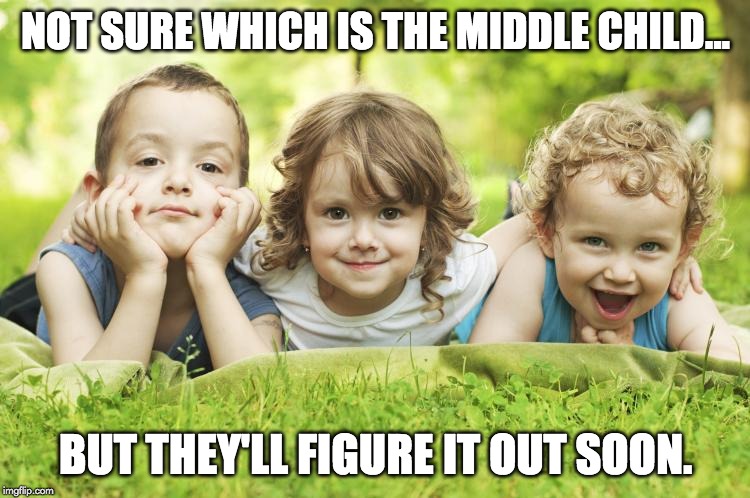Table of Contents (click to expand)
When a second child is born, parents often feel more relaxed and less overbearing; after all, they successfully raised one child, so the second feels easier. This can result in slightly less attention, comparatively, being given to the second child.
If you have both an older and younger sibling, middle child syndrome probably isn’t a new concept. Whether or not you feel that being a middle child has affected your life in a particular way, the subject has probably been raised at one time or another. There are a number of personality traits and woes commonly attributed to being a middle child, in relation to parental attention, social skills, relationship with siblings, academic success and dozens of other characteristics.
The question, of course, is whether being a middle child truly has any effect or not. The stereotype of a middle child may be a rebel, a loner, someone more likely to take risks, be more separated from parental authority… the black sheep of the family, per se. However, a significant amount of research has been done on this subject and some interesting conclusions have been reached. Before we get into whether middle child syndrome is real or not, let’s take a closer look at why and how this “syndrome” has become popularized in cultures around the world.
Middle Child Syndrome
When parents are graced with their first child, it is a life-changing experience, and one that deservedly dominates the majority of their time and attention. Hard lessons are learned and herculean tasks of parenting sacrifice are made to protect their precious firstborn. When a second child is born, parents often feel more relaxed and less overbearing; after all, they successfully raised one child, so the second feels easier. This can result in slightly less attention, comparatively, being given to the second child, particularly because the beloved firstborn still receives a good deal of energy and focus.

Thus, when a third child is born—the baby of the family—attention is once again shifted away from the second child. This sets up an interesting paradigm, where the firstborn and last-born enjoy the brunt of parental affection, while the middle child must ostensibly “fend for itself”. Essentially, the firstborn child will receive responsibilities, privileges and higher expectations from the parents, while the youngest child will have its needs indulged, forever being the “baby” and receiving special treatment. This is the proposed idea behind middle child syndrome, though certainly not a biological imperative, nor a phenomenon seen in every three-child family.
Also Read: Does Birth Order Impact Your Personality?
Is Middle Child Syndrome Real?
When viewed through the basic lens outlined above, it would seem that middle child syndrome has a clear foundation, one that might explain feelings of being “left out”, distanced from parental love, and more likely to find their own path forward. That being said, there are pros and cons for any child, regardless of their birth order, and given the infinite range of personalities, being a middle child isn’t inherently a bad thing. In fact, one’s place as a middle child may be a huge advantage in some cases.
Below, we’ll explore some of the common tropes or claims about middle child syndrome, and dig into both the positives and negatives, with the aim of unraveling the great middle child mystery. Many different studies have been conducted on middle children, and have revealed some surprising conclusions!
Parental Connection
While middle children may not receive as much attention and over-parenting as a family’s first precious bundle of joy, being a middle child certainly doesn’t suggest immediate neglect. Being raised from a slightly greater distance can also have its advantages when it comes to problem-solving and dependency issues that may be seen in both older and younger siblings.
Social Skills
Due to the potential sensation of feeling “left out”, studies have shown that middle children often display greater social skills, and are able to engage more effectively with different groups of people. By escaping the “firstborn” or “baby” labels, middle children may actually learn to operate in the world more efficiently, finding ways to fit in with diverse groups smoothly.
Rebellious Nature
Without the ever-present and watchful eye of parents worrying about every move they make, middle children may develop more rebellious behavior, leaning into the “black sheep” stereotype of the family. This may come from a place of wanting to draw more attention from inattentive parents, but could also be a form of boundary-pushing. When rules aren’t as firmly enforced, children are bound to stretch them, which can have any number of results, not all of which are bad.

World View
Similarly, children born in the middle are less likely to follow in their parents’ footsteps, as they may feel less pressure than their older sibling to “carry on the family business”, per se, or share an identical set of beliefs to their parents. Middle children may be able to avoid this pressure, exploring new ideas, communities, lifestyles and opportunities their older siblings were steered away from.
Sibling Relationships
Studies have shown that middle children may have weaker relationships with their parents, but in lieu of close dependence on parents, they instead reach out to and rely on siblings. This can generate close connections with siblings, which can be extremely nourishing and beneficial as children grow up.

Expectation And Pressure
Without the pressure to perform/excel that is placed on older children, or the overly protective response to the “baby” of the family, middle children often experience less projection from parents, and have fewer mental health problems. Anxiety and depression is seen in lower concentrations in middle children, as they may feel that they’re outside of their parents’ shadow.
Independence
As alluded to a few times already, being a middle child has the potential to make a person much more independent, as they have been relying on themselves for guidance, survival and validation since a young age. Later in life, this self-contained instinct can be very helpful, both in personal relationships and measures of self-esteem.

Thinking Patterns
While the number of middle children that attend college is lesser than the rates for firstborn and last-born children, this doesn’t mean a lower level of intelligence or education. Their slightly altered view of the world may encourage them to pursue less traditional passions or professions. For example, while a firstborn may feel inclined to study law or medicine, a middle child might not feel hesitant about pursuing visual art or music as their chosen path.
Also Read: Why Are Teenagers So Rebellious?
A Final Word
Birth order may seem like a very important element in your personality, as it could shape your view of the world during your formative years, but there isn’t a strong argument for the oldest or youngest child having a real advantage. Middle child syndrome seems to be a designation that has created an unfair or incomplete stereotype, rather than the other way around. Over the years, personality is shaped by countless factors; birth order may seem like an obvious variable, but it isn’t a decisive one!
How well do you understand the article above!

References (click to expand)
- The Impact of Birth Order on Romantic Relationships - alfredadler.edu
- Middle Child Syndrome | The Bison - The Link. Harding University
- (2002) A study of self-esteem in middle children - Rowan Digital Works. Rowan University
- (2011) Resilience among middle–born children - NWU-IR Home. North-West University
- Ph.D. C. S.,& Schumann K. (2012). The Secret Power of Middle Children: How Middleborns Can Harness Their Unexpected and Remarkable Abilities. Penguin Publishing Group
